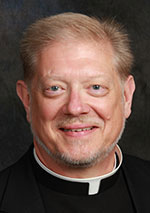That All May Be One / Fr. Rick Ginther
The ‘less traveled road’ of ecumenical and interreligious ministry
 A one-man show. A one-woman show. Going it alone. You are on your own.
A one-man show. A one-woman show. Going it alone. You are on your own.
Ecumenical and interreligious ministry at times can conjure such pithy sentences.
Even though these ministries are rooted in two documents of the Second Vatican Council … even though there are Vatican Councils for the Promoting of Christian Unity and Interreligious Dialogue … even though successive popes from St. John XXIII through Francis have made these ministries priorities. Still, the road can seem “less traveled.”
Being alone in this ministry is not my current experience in the archdiocese.
Successive bishops and archbishops – Daniel M. Buechlein, Christopher J. Coyne, Joseph W. Tobin and Charles C. Thompson—have clearly endorsed and encouraged this ministry.
Since April 2017, I have had the privilege of working with a group of clergy, religious and lay folks. They support this ministry as an advisory board.
Membership initially was small: Fathers Nicholas Dant and Michael Hoyt, Msgr. Paul Koetter, Franciscan Sister Norma Rocklage, Matt Hayes and Ed Mitchell. Each had expressed to me or through another their interest in this ministry.
Defining who we were as a board was not an immediate priority. Rather, I was seeking their wisdom wrought from experience and interest.
Our initial concerns were for our priests, deacons and parish life coordinators (PLCs). What are the challenges they face in being ecumenical and interreligious leaders?
In the fall of 2017, a survey instrument for our priests and PLCs was sent out. The response was gratifying—54.5 percent.
We learned of a basic hope for ecumenical connections, but a loss of how to make those connections. A lack of other religions in much of the rural part of our archdiocese was cause for less interreligious interest. Indianapolis, Columbus and the New Albany area were exceptions.
A permanent deacon retreat last June afforded an opportunity for some formation. The focus was on “A Spirituality of Ecumenism.” It was well received.
Discussions with Saint Meinrad Seminary and School of Theology in St. Meinrad led last fall to engaging first-theologian seminarians there. I introduced them to the basics of “why we do ecumenical relations.”
Such outreach encouraged the board to urge that more be done among the clergy and PLCs. Thus, we are embarking upon offering options for how to build greater local ecumenical connections through clergy associations and relationship building.
Connection with high schools’ experiences of interreligious and ecumenical student bodies is another step. That work began with initial conversations with Brebeuf Jesuit Preparatory School and Bishop Chatard High School, both in Indianapolis. More will follow.
How are our grade schoolers introduced to other Christians and other religions? That is a current focus of the office and the board. With the help of the archdiocesan offices of Catholic Schools and Catechesis, we are beginning to understand and lay some groundwork for collaboration.
The board’s presence at various events is an essential role for members. The Festival of Faiths, a Week of Prayer for Christian Unity, and the Center for Interfaith Cooperation annual celebrations, all in Indianapolis, offer such opportunities.
Additional members to the advisory board were added in 2018: Clare Bane, Charlie Wiles and Father Bryan Eyman, pastor of St. Athanasius the Great Byzantine Catholic Parish in Indianapolis.
The reality of our work has helped to shape a “definition” for the advisory board. It is advisory to the director for priority setting and ideas for implementation. Participation by the members in ecumenical and/or interreligious events is sought.
The board meets six times a year to assist the archdiocese in doing this important ministry.
We are blessed. I am grateful for such companions.
(Father Rick Ginther is director of the archdiocesan Office of Ecumenism and Interreligious Affairs. He is pastor of Our Lady of Lourdes Parish, Indianapolis.) †
 A one-man show. A one-woman show. Going it alone. You are on your own.
A one-man show. A one-woman show. Going it alone. You are on your own.